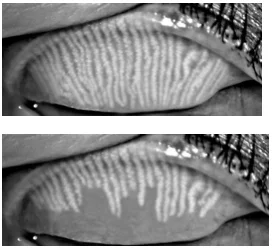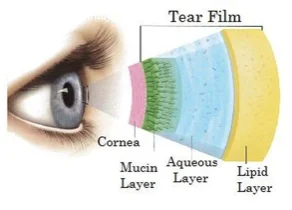If your eyes have been feeling a little more gritty, sandy or dry than usual, you’re not the only one. As we get cozy inside and turn on our heaters, the humidity and moisture our eyes love starts to drop. Irritation then starts to kick in making dry eyes a symptom we hear on a daily basis.
If you have ever been diagnosed with dry eyes you know it can be much more uncomfortable than it sounds. Dryness is not as benign as one would think. The cornea is the only organ in our whole body without blood vessels and it relies both on the quantity and quality of our tears to provide adequate hydration, oxygen and nutrients. If the cornea is not properly hydrated, decreased vision, persistent redness and ocular discomfort occurs.
Tear chemistry
Tears are made of three components.
The lipid/oil layer
Where our eyelashes insert into our eyelid there are about 30 tiny little oil producing glands called meibomian glands. They secrete the oil or lipids necessary to prevent our tears from evaporating.
The aqueous/water layer
Our lacrimal glands provide the foundation for the middle layer- the aqueous or water layer. This layer contains all the nutrients, such as salts and minerals, our eyes need to maintain a clear and comfortable surface.
The mucin Layer
The inner most layer is made of a mucus that acts as glue to keep the tears on the cornea and maintain a smooth and consistent tear surface.
What’s going on?
While there are many known causes for dry eye including environmental and hormonal factors, we now know the majority of dry eye can be divided into two categories- Evaporative Dry Eye and Aqueous Deficient Dry Eye. The majority of dry eye patients suffer from Evaporative Dry Eye, related to a deficiency in the oil production of the meibomian gland.
As mentioned, the oil maintains the integrity of the tears and if there is not enough of it, the tears will break up quickly and evaporate, leaving the burning, gritty irritation of “dry eye.” Most concerning, if the meibomian glands are placed under long term stress they will stop producing oil. This results in the year over year worsening of symptoms due to the chronic and progressive nature of dry eye disease.
What can we do?

Thanks to advances in ocular imaging we can perform meibomography with the Oculus which allows us to directly image the meibomian glands and assess the precise level of damage. Imaged at the top are healthy long straight and narrow meibomian glands, similar to the keys on a piano. Below is worsening of Evaporative Dry Eye where the glands have started to regress and stop producing the nutrient rich oils.
In addition to the Oculus meibomography, additional tests such as how fast tears break-up and evaporate, how much inflammation is present on the ocular surface and the volume of tear fluid can be analyzed to thoroughly evaluate the physiology of your tears.
After all data and information is gathered a treatment plan can be tailored to supplement your individual needs. Our end goal is to restore a normal and stable tear film. Patients should be aware that artificial tears most often only provide temporary relief. Fully restorative treatments may require prescription eye drops, supplemental nutraceuticals or in office treatments to properly manage dry eye disease.
Time is of the essence
No matter the current stage of the condition, it is important to identify the problem and treat it accordingly to prevent the condition from further progression and worsening of symptoms. If you suffer from Dry Eye Disease it is time to take a deeper look, schedule an appointment for your dry eye work-up today.












